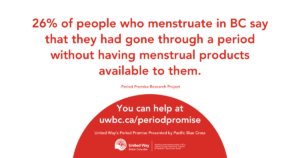October 22, 2023
Entre Nous Femmes Housing Society is pleased to provide an update regarding the recent ENF Period Promise Pilot Project. Last year, we received a grant from the Government of British Columbia in partnership with the United Way British Columbia to provide free menstrual products to residents as part of the ENF Period Promise Pilot Project.

The generous grant from the Period Poverty Pilot Project Fund enabled us to test different models to provide free menstrual products to residents living in Entre Nous Femmes subsidized housing communities. Our project was one of ten around the Province that intended to help inform the Period Poverty Task Force to make recommendations to the government in March 2024 on ways to eliminate period poverty in BC.
Project Objectives
- Gather insight & data to support product distribution in social housing communities
- Expand the promise of free period products to residents & increase menstrual equity
- Understand the prevalence of period poverty, barriers, stigma, & preferred products, quantities, and distribution options
- Inform how ENFHS can continue with the program after the Pilot and inform others in the community housing sector
About the Products
- The products were provided by socially and environmentally conscious local vendors, Revol Cares, Aisle, and Joni.
- ENFHS received a discount of 15% to 20% for gift cards and bulk purchases
About the Participants

Key Findings
- Participants were generally satisfied with the ENFHS Period Promise Pilot Project and there is strong support from residents for ENFHS to continue to provide free menstrual products.
- Access to free menstrual products reduced period poverty and improved participants well-being.
- There was general satisfaction about the overall quality of menstrual products received, but the quantity of reusable menstrual products provided may not be enough to satisfy participant’s needs
- Participants prefer receiving e-gift cards to order menstrual products online and have products delivered by mail or by ENFHS staff
- If free reusable menstrual products were available, a significant number of participants would likely switch from disposable to reusable products.
Conclusions
- Providing free products can relieve financial, accessibility (cultural or social) or physical mobility challenges
- $100 to $150 per resident can make a significant difference in reducing period poverty and improving well-being
- Initial investment of $10k to $15k per 100 participants required
- Estimated to cost between $4000 to $6000 annually to sustain the program with reusable products
- The Period Promise Project could be a viable program for non-profit social housing organizations of a similar size
To view the full report, click here
